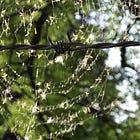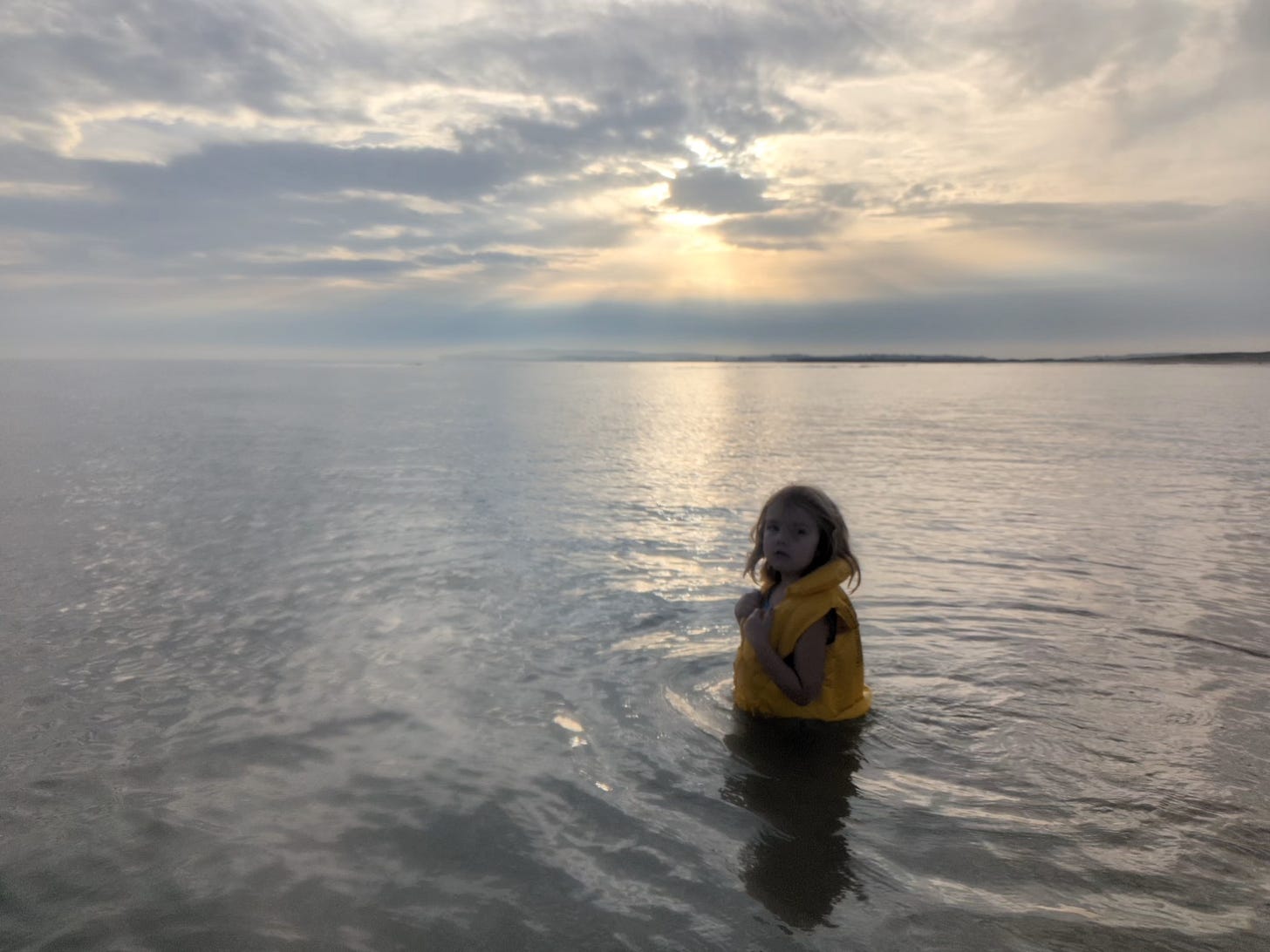Consolation and Melancholy
I started this Substack site partly motivated by my current research, as an incentive to write with freedom and spontaneity when ideas occur to me unencumbered by the agitation of causes and campaigns:
This is a place for experimental writing, for trying out ideas, and for meandering along pathways of creative thinking that don’t necessarily lead anywhere and with no clear destination in mind. The purpose is in the writing, and the pleasure is in what unexpected encounters with language and meaning occur along the way. I ask how language might acquire the tensile strength of a spider’s web — giving shape to air and absence, woven out of silken threads that are strong enough to bear the weight of meaning far beyond their seeming fragility.
The labyrinthine process of reading around questions posed by language, creation, silence, and desire has led along many overgrown paths, through the bogs and marshes of the mind, sometimes opening into luminous clearings in which the not-yet, the unknown and unknowable, manifests itself in the dissolution of the self.
We might turn to Heidegger or to Buddhism to ask what this means, or to Catherine of Siena or Mechthild of Magdeburg or to any number of poets, dreamers, and mystics. Who knows what paths of encounter and communion emerge when we are in that realm whereof we cannot speak, yet speak we must, retracing our steps from meaningful silence beyond words, back into the language and meanings gifted to us by our cultures, our histories, our mothers’ tongues?
Those who are guiding me through this process of research beyond methodologies, disciplinary boundaries or clear objectives share mysterious connections. They weave patterns of meaning in which one text leads to another, each idea seeding a multitude of others, drawing me into conversations with past and present writers with promises of thinking and living beyond what now seems possible.
Today’s reflection is inspired by the latest post in Victoria Moul’s Horace & Friends.
Multilingual people arouse in me feelings of envy, inadequacy, admiration, and determination to persevere with Duolingo’s language learning app. The ability not only to speak another language but to understand its subtleties, cadences, and ambiguities, and above all its jokes (there is nothing so culturally specific, sensitive, and revealing as humour), must be like inhabiting parallel universes. Victoria Moul is generous with her multilingual gifts, opening windows that offer glimpses into those universes.
Unlike on social media (Twitter has rightly become a Black Cross, with all the layers of meaning implied by that symbol), the people I follow on Substack are those who nourish my imagination and liberate my mind. It takes more self-discipline than I have to stay away from that Black Cross and immerse myself in more wholesome reading every morning to start the day afresh, but I’m so glad when I do.
Today I’m sharing the gift I was given by Moul’s post, “Doing Without Consolation: Tamil Poetry, Yeats and Simone Weil”:
A meditation on Tamil poems about the seductions and sorrows of a young girl’s adolescence segues into a reflection on Helen of Troy and Yeats’ poem, “Long-Legged Fly”, with its enigmatic imagery evoked by these lines that form a refrain to the verses:
Like a long-legged fly upon the stream
Her mind moves upon silence
Thus Moul unexpectedly guided me back to the significance of silence - a topic that I return to again and again in these Substack posts.
Reflecting on silence allows the sounds of silence to emerge in ways that ask to be interpreted. There is the silence that, with patience and attentiveness, allows the quietened mind to float upon the watery darkness of the subconscious self, where half-formed yearnings and desires, fears and sorrows, sway in restless currents beyond the reach of words.
There is the knowing silence which is discretion born of discernment, of understanding that there is a time to be silent even when one thinks one knows, (I’m not good at this kind of silence). There is the silence of restful companionship, when intimate lovers and friends enjoy a relationship that is not threatened by silent communion. And there is the self-imposed silence which resists the duty to speak for fear of condemnation, disapproval, and judgment. When I break this silence, as I often feel I must (not always correctly, for sometimes I cause needless pain when patient and trusting silence would have been better), the cost I pay is distraction, agitation, a temptation to write only in angry polemics. This kind of speaking out moves ambiguously between the virtue of discerning silence and the courage of taking a stand, rarely offering the consolation of a satisfied conscience or a calm inner life.
Yeats’ “Long-Legged Fly” evokes the first kind of silence — the attentive mind that allows one to stay afloat, drifting on the tides, rising and falling with the waves, sensitive to the undercurrents, alert to the sighs and whispers of the soul (and who is to say that these are not the sighs and whispers of God?), without drowning in the depths of the abject.
Moul quotes Simone Weil: “Love is not consolation, it is light.” She continues:
Always, beyond the particular object whatever it may be, we have to fix our will on the void — to will the void. For the good which we can neither picture nor define is a void for us. But this void is fuller than all fullnesses.
[. . .]
We must leave on on one side the beliefs which fill up voids and sweeten what is bitter. The belief in immortality. The belief in the utility of sin: etiam peccata. The belief in the providential ordering of events — in short the “consolations” which are ordinarily sought in religion.
I’ve recently been reflecting on Nick Cave’s journey through bereavement and crisis to new ways of exploring language, faith, and meaning. A series of interviews between Cave and journalist Seán O’Hagan is titled Faith, Hope and Carnage. Perhaps Cave comes close to what Weil means when she writes of the fullness of the void and relinquishing the consolations of religion. In an interview with Krista Tippett on the On Being website, Cave explains why he relates to the biblical story of Christ, “especially in the scene of Christ in the garden praying and a God that had withdrawn his favor”. He says,
I find that a compelling story and very beautiful, too, and very human. The sense of yearning, the sense of being tethered to the earth but reaching beyond ourselves in some kind of way is the story, I think, of everyone in a way.
He continues:
It feels to me that loss is our universal state as human beings. … [W]e are all feeling these senses of loss, whether it’s directly personal, it’s bred into us, that sense of yearning. And that’s not a failure. It’s a condition. … It is our condition. And I think that if we’re honest with ourselves, most people feel this way: a sense of lostness about things and a need for something beyond that. That’s my defense of religion, I guess. [laughs] (This is a transcript of the interview on the website)
Maria Popova’s online magazine, The Marginalian, changes me a little every time I read one of the posts. There’s an interview with Popova by Tippett, also on the On Being website, which is well worth listening to. Cave’s words resonate with Popova’s observation in that interview:
We never see the world exactly as it is. We see it as we hope it will be or we fear it might be. And we spend our lives going through a sort of modified stages of grief about that realization. We deny it, and then we argue with it, and we despair over it. But eventually — and this is my belief — we come to see it, not as despairing, but as vitalizing.
In a review of my 2013 book, Theology After Postmodernity, Rachel J. Smith refers to the. book’s “melancholy tone”. It’s a thought-provoking review —critical in ways that witness to an attentive and careful reading. Such reviews are both unsettling and sustaining, for they expose fractures in a text that paradoxically affirm what it was trying to do, even if ultimately it failed — and surely, every text must fail at some level?
Smith writes that my book
bears witness to de Certeau’s notion of the excess in history. The medieval theology [Beattie] writes about is not a thirteenth-century trash heap that she attempts to remake into a simulacra of the original but a living theological inheritance by which she is claimed, one to which she is beholden but one that is lost to her even as it lives on in her faith. The book is a document of her own melancholic longing for its resurrection.
I’m grateful for those words, because they help me to recognise something I was unaware of when writing the book. Jennifer Reek also offers a critical insight into how my anxiety to remain faithful to a doctrinal tradition is often in tension with my straining against the conventions and dictates of that tradition in my quest for the transformation of language.1 Reek urges me to a deeper engagement with texts, including poetry, to avoid what she perceives as a separation between life and text in my 2005 book, New Catholic Feminism: Theology and Theory. Perceptive and challenging, Reek’s criticism has had a profound influence on the development of my ideas.
I’m less tethered by anxiety to uphold the Catholic doctrinal tradition than I was, but the melancholic longing for its resurrection to which Smith refers is perhaps even deeper than it used to be. Is it possible to relinquish one’s tight grip on a story that continues to shape the human condition and accommodate its most sublime achievements and its most abject failures, without a sense of melancholy? Even the deepest readings of poetry and literature cannot substitute for those biblical stories of incarnate and suffering divine life that resonate through history and writhe their way through doctrinal and liturgical practices, enfleshed in communities of love and war, joy and despair.
But the consolations of religion so often mutate into various forms of nationalism, bigotry, and tyranny, as defences against the insecurities and fears of our times. Western Christianity is freighted with the baggage of empire, race, and power, domesticated to sanctify the status quo. Donald Trump has just endorsed a MAGA Bible. There is painful but necessary liberation in letting go of its consoling platitudes. People like Cave dare to articulate different ways of believing and belonging, forged in the crucible of sorrow and doubt. Might they be the ones who will carry the torch from neoliberal secularism with its fringe religious movements, to a less confident but more hopeful and compassionate culture of believing and belonging? Of course such a culture exists, in the anonymous thousands of ordinary people who translate their faith into daily acts of peace, courage and compassion, but the structures, institutions and hierarchies of Christianity are crumbling under the weight of their own artifice, in a world crying out for meaning that they can no longer offer.
Yet Weil’s letting go of the consolation of all that sustains us is an extreme and sometimes dangerous quest, for as Nietzsche observed, “if you gaze long into an abyss, the abyss gazes also into you.” Elsewhere, Weil refers to “decreation” — a concept that she doesn’t fully develop, but it’s consistent with her quest in many of her writings to push herself beyond all boundaries of endurance and meaning, to experience for herself perhaps the extreme desolation of affliction.
Silence risks abjection, if we go out too far beyond our depth. This is the silence that tips the mystic into madness, though we should beware of thinking we know where the borderline is, or indeed if there is a borderline. Are we not all a little mad sometimes? Is this not a kind of freedom, an ethical imperative indeed, to be mad in the eyes of this mad world? Might it even be our ultimate defense against AI and all the robotic calculations and rationalisations that would colonise our souls? My little autistic grandson struggles with “big feelings”. I mourn that our human world is too small for his vast emotional inscape.
Julia Kristeva describes the loss of self that abjection entails:
If it be true that the abject simultaneously beseeched and pulverizes the subject, one can understand that it is experienced at the peak of its strength when that subject, weary of fruitless attempts to identify with something on the outside, finds the impossible within; when it finds that the impossible constitutes is very being, that it is none other than abject. The abjection of self would be the culminating form of that experience of the subject to which it is revealed that all its objects are based merely on the inaugural loss that laid the foundations of its own being. There is nothing like the abjection of self to show that all abjection is in fact recognition of the want on which any being, meaning, language, or desire is founded. … [F]ear having been bracketed, discourse will seem tenable only if it ceaselessly confronts that otherness a burden both repellent and repelled, a deep well of memory that is unapproachable and intimate: the abject.2
Is abjection a curse or a luxury? It’s where mystics discover wisdom and others drown in madness: “The time of abjection is double: a time of oblivion and thunder, of veiled infinity and the moment when revelation bursts forth.”3 It’s that state of melancholia and withdrawal that so many women have discovered to be a form of resistance and liberation. From Julian of Norwich to Florence Nightingale, women have sought validity through becoming invalids.
Did Simone Weil drive herself into the abject in order to feel its darkness, the consuming demands of flesh tormented beyond desire, beyond pity, even beyond redemption? For Weil, the abjection of the soul is inseparable from the body afflicted by suffering beyond endurance. It is the affliction of Job, and of Christ:
Affliction renders God (God seems) absent for a time, more absent than a dead man, more absent than the light in a completely dark cell. A sort of horror submerges the whole soul. During this absence there is nothing to love. What is terrible is that in this darkness when there is nothing to love, if the soul ceases to love, the absence of God becomes definitive. The soul must continue to love in the void - or at least want to love - be it even with an infinitesimal part of itself. Then one day God comes to manifest Himself to them and reveals the beauty of the world, like God did in the case of Job. But if the soul ceases to love, it falls into something here below that is nearly equivalent to hell.4
Weil came close to visiting such affliction upon herself, as did many women mystics (better referred to as vernacular theologians), in harsh forms of asceticism. There’s enough suffering in this world without us voluntarily adding to it by self-mortification. But compassion (suffering-with) is also a form of suffering, and it surely emerges from the soul’s wanting to love, which saves us from hell. There are forms of suffering, just as there are forms of silence, voluntary and involuntary, nurturing and consuming. Like silence, suffering can lead to the deepening and enriching of the self, but it can also lead to the abjection and desolation of the self.
I don’t think Weil’s idea of affliction is the same as Kristeva’s idea of abjection. The former is extreme mental distress associated with unbearable physical suffering, while the latter is more psychological than physical — though of course body and soul are never free of the other’s influence.
My own quest for silence keeps a safe distance between myself and the abject. It’s like my swimming in the sea, which is meditative and cautious. I don’t take risks, and I do it for calm relaxation, not for exercise. The silence I’ve been exploring in my research and reflections is more like that than a wild plunging into the riptide of the unconscious and its dark undertow.


Nevertheless, to venture out beyond our depth is to enter a state of attentiveness and vigilance, fringed with terror. It’s to become aware of the currents that wrap around the limbs, warm and then cold, sucking and swirling. It’s to watch the tides and calculate their rhythms and their risks. It’s to listen to one’s body, its unfurling delight and its potentially dangerous cooling. All these are metaphors for that silence which for me is a melancholic letting go of religion’s consolations while nevertheless daring to pray, to participate in the eucharistic mystery, to hope, to trust.
Maybe this is less like the wild swimmer plunging into whirlpools of yearning and desolation, and more like my granddaughter when she wears her life vest and struggles free of my grip, telling me to let her go but glancing over her shoulder to make sure I haven’t abandoned her as she wades out towards the setting sun.
And now she comes into my study to snuggle on my lap, tousle-haired and warm with sleep. I leave this here, unfinished, awaiting what comes next.
See Jennifer Reek, A Poetics of Church: Reading and Writing Sacred Spaces of Poetic Indwelling, pp. 32-34.
Julia Kristeva, Powers of Horror, pp. 5-6. I’m quoting from this 1982 edition. A later edition is now available.
Kristeva, Powers of Horror, p. 9.
Simone Weil, “The Love of God and Affliction”, pp. 33-34 - from Brad Jersak’s 2012 translation.








